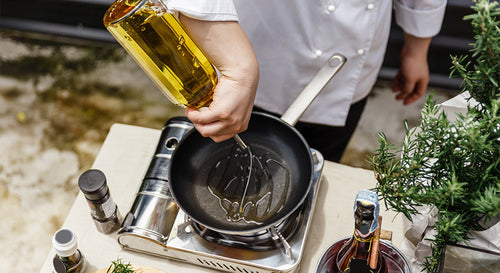Restaurants – EVOO and Cooking

Within the food industry, there is some serious discussion over when and where to use extra virgin olive oil (EVOO) when preparing food. Even those who are against its use in cooking regularly recognize the benefits and say that sometimes it is best to use EVOO. However, the conversation typically revolves around how best to use it.
Dispelling the Myth,
"You can't cook with EVOO"
The first thing to address is the myth that you cannot cook with olive oil. EVOO in particular is safe to use when cooking and it will not create unhealthy levels of free fatty acid, which makes it a much healthier alternative to many other types of cooking oils and additives. By adding it to food, restaurants are taking care of both your satisfaction with the flavor of your food and your health.
Benefits of EVOO for Cooking
One of the reasons that so many people recommend using EVOO when cooking is its fat composition, which helps bring out more flavor in the food. Depending on how it is cooked, it can also enhance the nutrients within some foods, such as tomatoes. Compared to many other types of oil, such as safflower, corn, and sunflower oils, EVOO provides a stable fat composition for many types of cooking. The fats in EVOO are also healthier types of fats, and it is low in the less healthy fats, such as fatty acids. This is because free fatty acids are generally created when oils oxidize during cooking. Because EVOO is more stable, it does not generate fatty acids as it cooks.
While the health benefits tend to be positive, it is really the enhancement of flavor that makes EVOO so popular in restaurants. It provides a hint of additional flavor and enhances the flavor of the other ingredients without overpowering them. This is true for cooking, grilling, frying, and baking. By using EVOO instead of butter, restaurants reduce the saturated fats in their meals. When you are considering where to eat, this can be a major factor to think about so that you don’t have to sacrifice healthy for convenience.
Olive Oil Smoke Point
Smoke point is something that restaurants need to consider when cooking with different types of oils. The smoke point of each type of oil is different, including the different degrees of purity of the types of oils. Any cooking oil will begin to smoke once it is heated to a certain temperature, and that temperature varies for each oil. While there is a temperature range for each type of oil, the purer an oil is, the higher the smoke point will be. Unless you want your food to taste smoky, this is generally something that restaurants keep in mind when cooking.
 How to Bake with EVOO
How to Bake with EVOO
Baking with EVOO may be a little trickier because of the length of time the ingredients will be exposed to heat. Despite having a high smoke point, the longer EVOO is in a small, confined place the faster it breaks down. However, it is a much healthier alternative to substances like butter. With a lower saturated fat content, the final product will be better for restaurant patrons without having to sacrifice taste. It can also change the flavor of baked goods in a way that will attract attention because it is much more nuanced and mild compared to butter.
How to Fry with EVOO
While it is true that you must be careful when frying with EVOO, it is also true that you should always be cautious when frying with any oils. With a smoke point in excess of 425 degrees Fahrenheit, you can safely fry at the typical temperature of 350 degrees Fahrenheit. As EVOO is the highest quality of olive oil, it is much safer to use when frying than other types of olive oil because it does have a higher smoke point.
When to Avoid EVOO
Despite the many marvelous uses for EVOO, there are times when you should use an alternative. The levels of phenols and polyphenols can make it unstable when heated because certain aspects degrade too quickly. When cooking in a small, covered container, it can lose some of the health benefits. The rapid loss of nutrients can make it less appealing in these instances.


 How to Bake with EVOO
How to Bake with EVOO